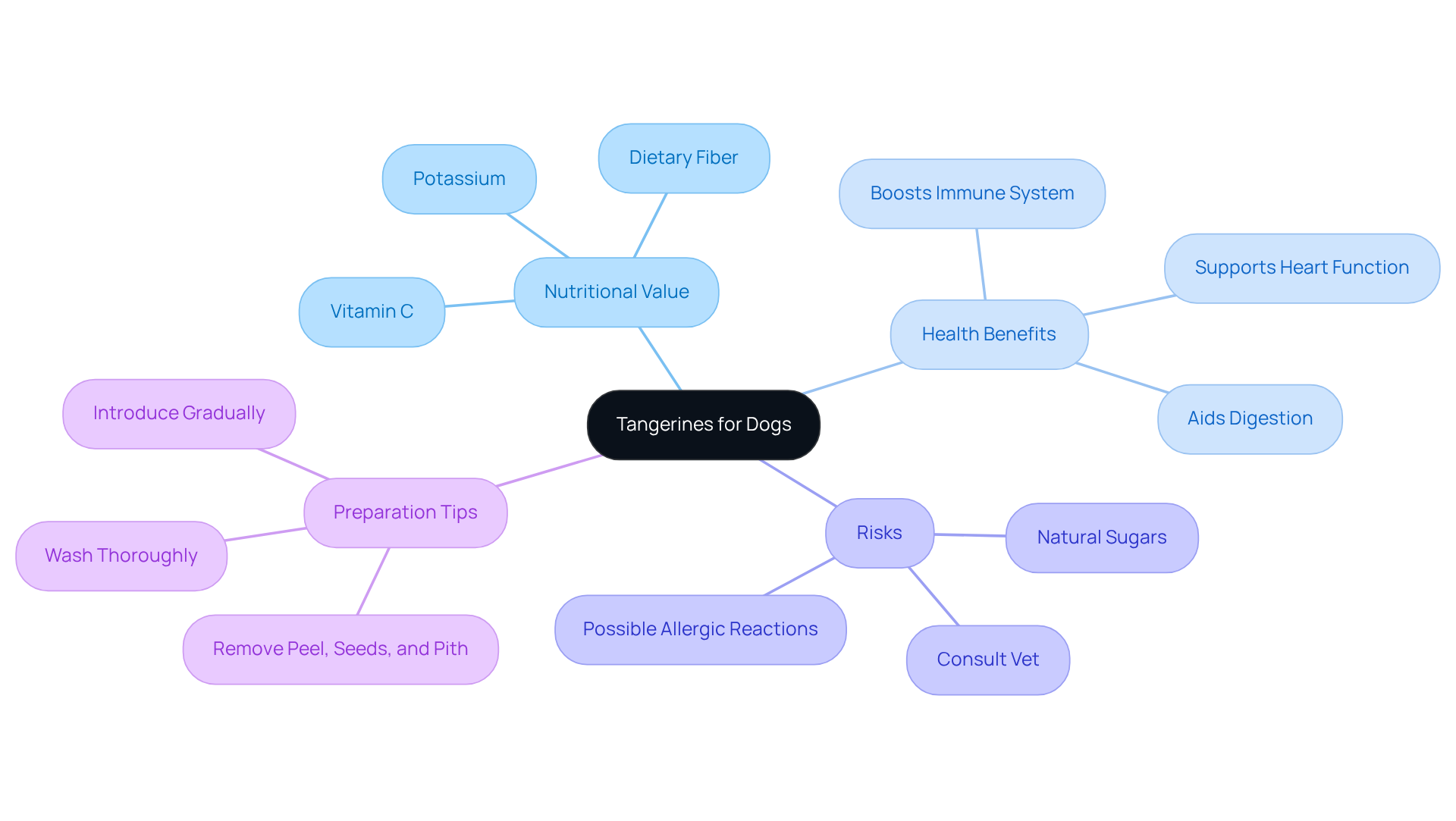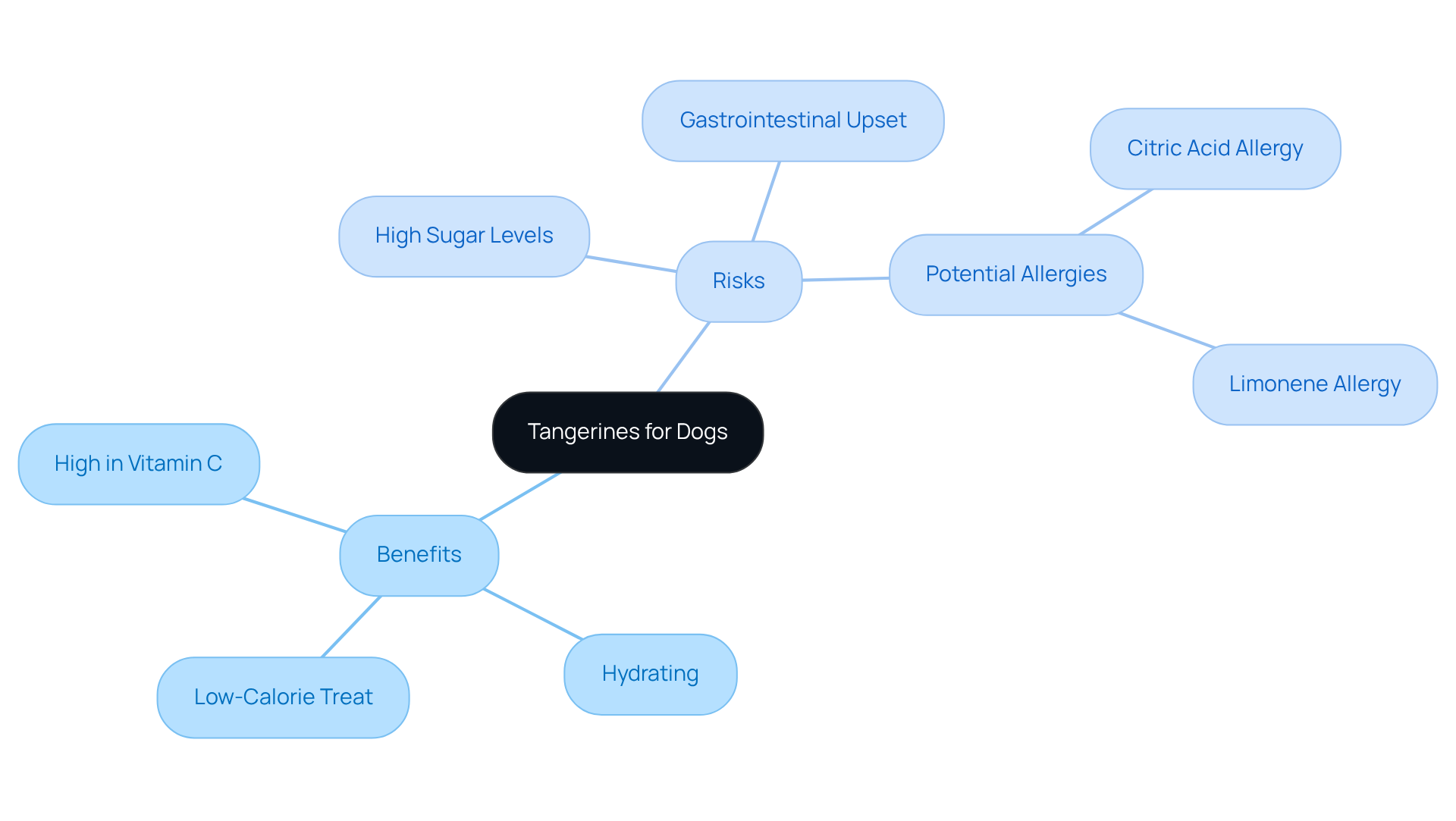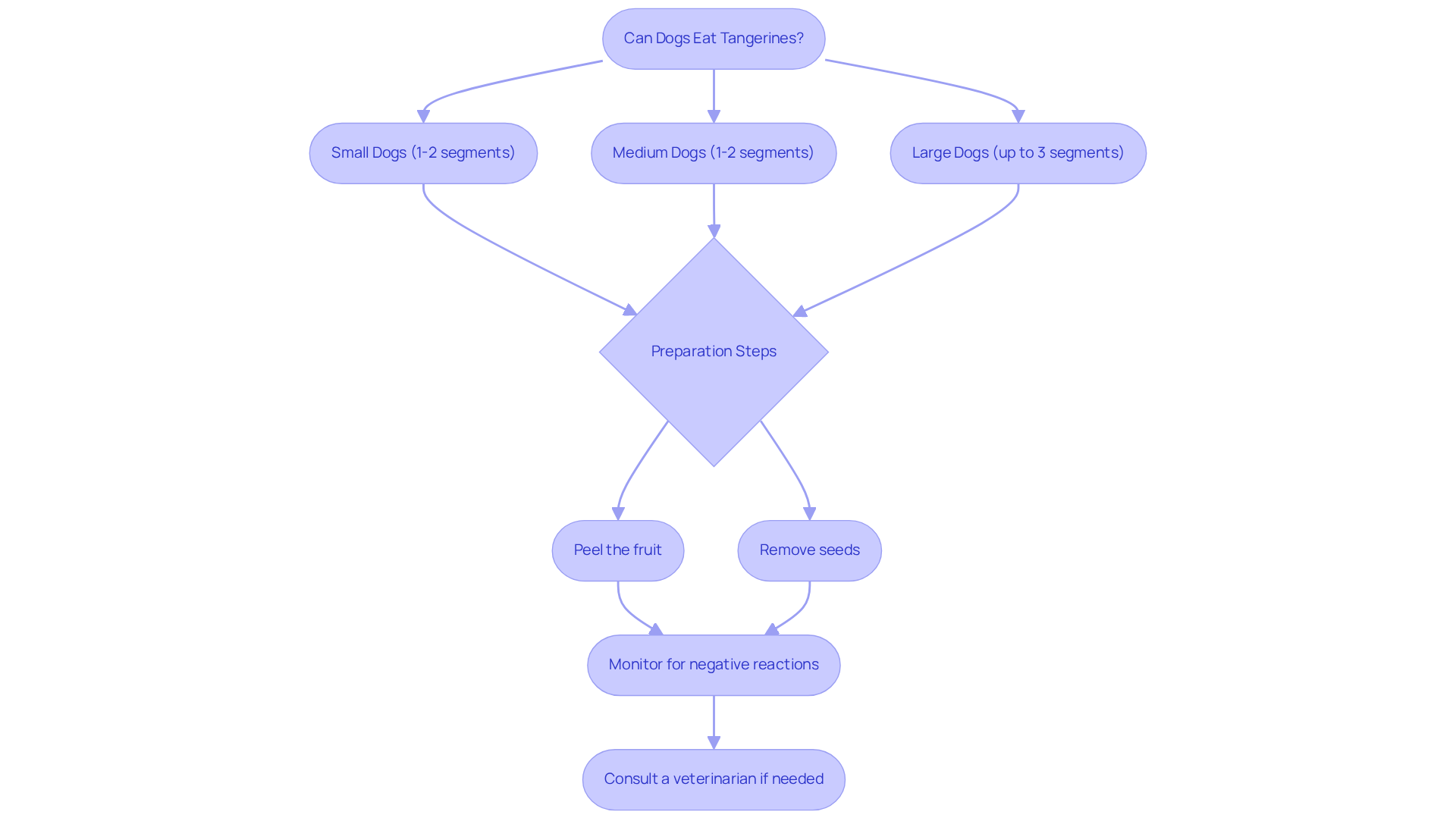Can Dogs Eat Tangerines? Understanding Benefits and Risks
Overview
As a loving pet owner, you may wonder if your furry family members can enjoy tangerines. The good news is that dogs can eat tangerines in moderation! These delightful fruits offer nutritional benefits, including vitamin C and potassium, which can support their immune system and overall health. However, it’s essential to be mindful of the natural sugars and acidity found in tangerines. These factors can lead to gastrointestinal upset and other health issues.
At Adventure Den, we understand your concerns about your pet’s well-being. That’s why we emphasize the importance of consulting a veterinarian before introducing any new foods, including tangerines, into your dog’s diet. By doing so, you ensure that your beloved companion stays healthy and happy. Remember, your dog’s health is our priority, and we are here to support you in creating a nurturing environment for your pet.
Introduction
Tangerines, with their vibrant color and refreshing sweetness, are often a cherished delight among fruit lovers. For devoted dog owners, a pressing question arises: can these citrus treasures serve as a healthy treat for your furry family members? Rich in essential nutrients like vitamin C and potassium, tangerines present potential health benefits. However, they also come with certain risks that deserve careful consideration.
How can you, as a loving pet parent, navigate the delicate balance between providing a nutritious snack and ensuring your dog’s safety?
Define Tangerines and Their Nutritional Value for Dogs
Tangerines, those delightful small citrus fruits from the mandarin family, are not just celebrated for their sweet flavor and easy-to-peel skin; when considering if can dogs eat tangerines, they can also bring nutritional benefits to your furry family members when offered in moderation. Packed with vitamin C, potassium, and dietary fiber, these fruits raise the question of whether can dogs eat tangerines to support their health. Vitamin C serves as a powerful antioxidant, helping to bolster the immune system and fend off illnesses, while potassium is essential for sustaining heart and muscle function. Additionally, the fiber content aids digestion and enhances overall gut wellness.
However, as a caring pet owner, it’s important to be aware of the natural sugars found in mandarins. Excessive intake can lead to wellness problems for your beloved pet. Therefore, consulting with a veterinarian before determining if can dogs eat tangerines is highly recommended, especially for dogs with prior medical issues. When prepared correctly—by removing the peel, seeds, and pith—tangerines can serve as a delightful and nutritious addition to their meals, ensuring both safety and well-being.
By choosing to include tangerines in your dog’s diet, you’re not only providing a tasty treat but also nurturing their health. Remember, your pet deserves the best, and taking these small steps can make a big difference in their overall happiness.

Examine Health Benefits and Risks of Tangerines for Dogs
You might wonder, can dogs eat tangerines, as they can be a nutritious addition to your furry family member’s diet, offering benefits such as boosting their immune system thanks to their high vitamin C content. They are also hydrating and serve as a low-calorie treat alternative, which many pet owners appreciate. However, it’s important to be aware of the associated risks. The elevated sugar levels in mandarins can lead to weight gain and exacerbate health issues in overweight or diabetic dogs.
Additionally, the acidity of mandarins may cause gastrointestinal upset, including diarrhea or vomiting, in some pets. Observing your dog’s response when introducing citrus fruits is essential to ensure their well-being. In a case study titled ‘Can Dogs Eat Tangerines, Mandarin Oranges, or Clementines?’, the focus is on the question of can dogs eat tangerines it was noted that while many dogs enjoy the flavor of citrus fruits, some may experience negative reactions, underscoring the importance of moderation.
Expert Angela Vuckovic advises that ‘Oranges shouldn’t be a daily indulgence but rather a rare luxury.’ This suggests that these fruits should be given infrequently, especially to dogs with existing health concerns, to prevent potential complications. Furthermore, some dogs may have allergies to citric acid, leading to symptoms such as skin inflammation or itching. By being mindful of these factors, you can create a nurturing environment for your beloved pet.

Guide on Safe Serving Sizes and Preparation of Tangerines for Dogs
When considering if can dogs eat tangerines, it’s essential to remember that moderation is key when adding mandarins to your furry family member’s diet. For small dogs, offering just a segment or two is adequate, while medium-sized dogs can typically handle one to two segments. Larger breeds may enjoy up to three segments. Always remember to peel the citrus fruit and remove any seeds before serving, as the peel and seeds can be hard to digest and pose choking hazards. It’s wise to start with small amounts to monitor your dog’s reaction. If any negative effects, such as gastrointestinal distress, arise, please stop providing citrus fruit and consult with your veterinarian.
Additionally, treats should not exceed 10% of your dog’s daily caloric intake. Proper preparation not only enhances safety but also allows your dog to enjoy the nutritional advantages of citrus fruits, which include vitamin C and potassium, without the hazards linked to improper serving. As RVT Rachel Hinder mentions, “Providing canines with small amounts of citrus fruits won’t harm them and will offer some of those essential nutrients.” However, it’s important to note that dogs with sensitive stomachs, or those that are overweight or diabetic, should avoid tangerines, leading to concerns about whether can dogs eat tangerines. Instead, consider offering alternative dog-safe fruits like apples and blueberries, which can serve as healthier treat options. Your commitment to your pet’s well-being truly makes a difference in creating a nurturing environment for them.

Conclusion
Tangerines can indeed be a delightful treat for your furry family members when offered in moderation. These small citrus fruits provide various nutritional benefits that can enhance their health. Rich in essential vitamins and minerals, particularly vitamin C and potassium, tangerines play a crucial role in supporting the immune system and maintaining heart health. However, it is vital for pet owners to approach this addition to their dog’s diet with caution. Always ensure safety and well-being by consulting with a veterinarian and adhering to proper preparation guidelines.
This article highlights the dual nature of tangerines, showcasing both their benefits and potential risks. While dogs can enjoy the hydrating and immune-boosting properties of tangerines, excessive consumption can lead to weight gain, gastrointestinal upset, and allergic reactions in some pets. Moderation is emphasized, with recommendations on appropriate serving sizes based on your dog’s size. Additionally, removing peels and seeds is important to prevent choking hazards.
Ultimately, the key takeaway is the importance of informed decision-making when it comes to your dog’s diet. By understanding the nutritional value and potential risks associated with tangerines, you can make thoughtful choices that contribute to your furry friends’ health and happiness. Consider exploring alternative fruits that may offer similar benefits without the risks, ensuring that your pet enjoys a varied and safe diet. Your commitment to their well-being is what truly nurtures a loving environment for them.
Frequently Asked Questions
What are tangerines and their nutritional benefits for dogs?
Tangerines are small citrus fruits from the mandarin family that offer nutritional benefits to dogs when given in moderation. They are packed with vitamin C, potassium, and dietary fiber, which can support a dog’s immune system, heart and muscle function, and digestion.
Can dogs eat tangerines?
Yes, dogs can eat tangerines, but it is important to do so in moderation. Consulting with a veterinarian is recommended, especially for dogs with prior medical issues.
What precautions should be taken when feeding tangerines to dogs?
When preparing tangerines for dogs, it is essential to remove the peel, seeds, and pith to ensure safety. Additionally, be mindful of the natural sugars present in mandarins, as excessive intake can lead to wellness problems.
What role does vitamin C play in a dog’s diet?
Vitamin C serves as a powerful antioxidant that helps bolster the immune system and fend off illnesses in dogs.
Why is potassium important for dogs?
Potassium is essential for sustaining heart and muscle function, making it an important nutrient in a dog’s diet.
How does dietary fiber benefit dogs?
The fiber content in tangerines aids digestion and enhances overall gut wellness in dogs.







